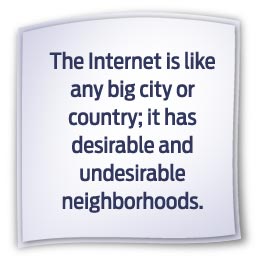
While i was traveling in a foreign country my computer picked up a vexing virus. It hid every file in every folder on a flash drive I was using. The virus caused every file to be invisible, inaccessible, and inoperative. Providentially, a computer technician recognized the virus and resolved the problem. All the files were restored.
That experience caused me to reflect on related spiritual principles. Computers, the Internet, and all that comes with them can be a blessing or a curse. Just 30 years ago it was hard to imagine how much power and control we could have with just a few clicks of what became known as a “mouse.” Yet while the mouse and the Internet have revolutionized our world, they also highlight some of the shadowy and seamy aspects of human nature. Authorities now view the Internet as a wide-open smorgasbord of the sublime, the ridiculous, and, most disturbingly, the salacious and the downright scary. Little did anyone know that a little mouse would lead us down a rabbit hole of both wonder and unimagined wickedness.
 The Internet is like any big city or country; it has desirable and undesirable neighborhoods. These neighborhoods are known as “domains.” Each domain is represented by site addresses of the dot-characters you type (.com, .info, .edu, .net, etc.). Like different neighborhoods, domains have established reputations based on the character of the people or businesses who “populate” them. Some domains are delightful; others are just plain devilish.
The Internet is like any big city or country; it has desirable and undesirable neighborhoods. These neighborhoods are known as “domains.” Each domain is represented by site addresses of the dot-characters you type (.com, .info, .edu, .net, etc.). Like different neighborhoods, domains have established reputations based on the character of the people or businesses who “populate” them. Some domains are delightful; others are just plain devilish.
Recently McAfee, a leading provider of Internet security for personal computers, released its list of the most dangerous domains on the Internet: “Mapping the Mal Web” (“mal” being shorthand for malicious). Visiting such sites can be risky and dangerous; beyond that they can be bad for one’s spiritual and mental health and can become habit-forming. Spending time clicking around dangerous domains can also be bad for your computer, given all the viruses, malware, and spyware out there.
Content isn’t the only way a domain is evaluated. McAfee’s number one most dangerous domain, for example, is the .com family of sites. The most prevalent domain is also the most likely to mess up your machine if you aren’t careful. Second is the .info (information) domain. A good rule is to avoid visiting Internet sites that you wouldn’t consider suitable vacation spots, or sites you wouldn’t want others to know you frequent. Some of the safest domains are places such as travel sites (.travel) and education sites (.edu).
More harmful than viruses is the effect these dangerous domains can have on the person visiting them. Sites dealing with pornography, gambling, get-rich-quick schemes, certain chat rooms, and social networks are all ideal sources for both computer and sin viruses. Life-binding addictions and slavery result from the soul-destructive sights, sounds, and impressions of these sites.
Ellen White provides a powerfully simple strategy for avoiding dangerous domains, which I’ve assembled under the acronym GUARD:
Goal: “We have a work to do to resist temptation. Those who would not fall a prey to Satan’s devices must guard well the avenues of the soul; they must avoid reading, seeing, or hearing that which will suggest impure thoughts.
Unshackle: “The mind should not be left to wander at random upon every subject that the adversary of souls may suggest. . . .
Aim: “Says Paul, ‘Whatsoever things are true, . . . honest, . . . just, . . . pure, . . . lovely, . . . of good report; if there be any virtue, and . . . any praise, think on these things’ (Phil. 4:8).
Reinforce: “This will require earnest prayer and unceasing watchfulness. We must be aided by the abiding influence of the Holy Spirit, which will attract the mind upward, and habituate it to dwell on pure and holy things.
Defend: “And we must give diligent study to the word of God” (Patriarchs and Prophets, p. 460).
The only antidote to dealing with dangerous domains is a relationship with Jesus Christ, the ultimate Administrator and Webmaster.
____________
Delbert W. Baker is a general vice president of the General Conference. This article was published July 28, 2011.